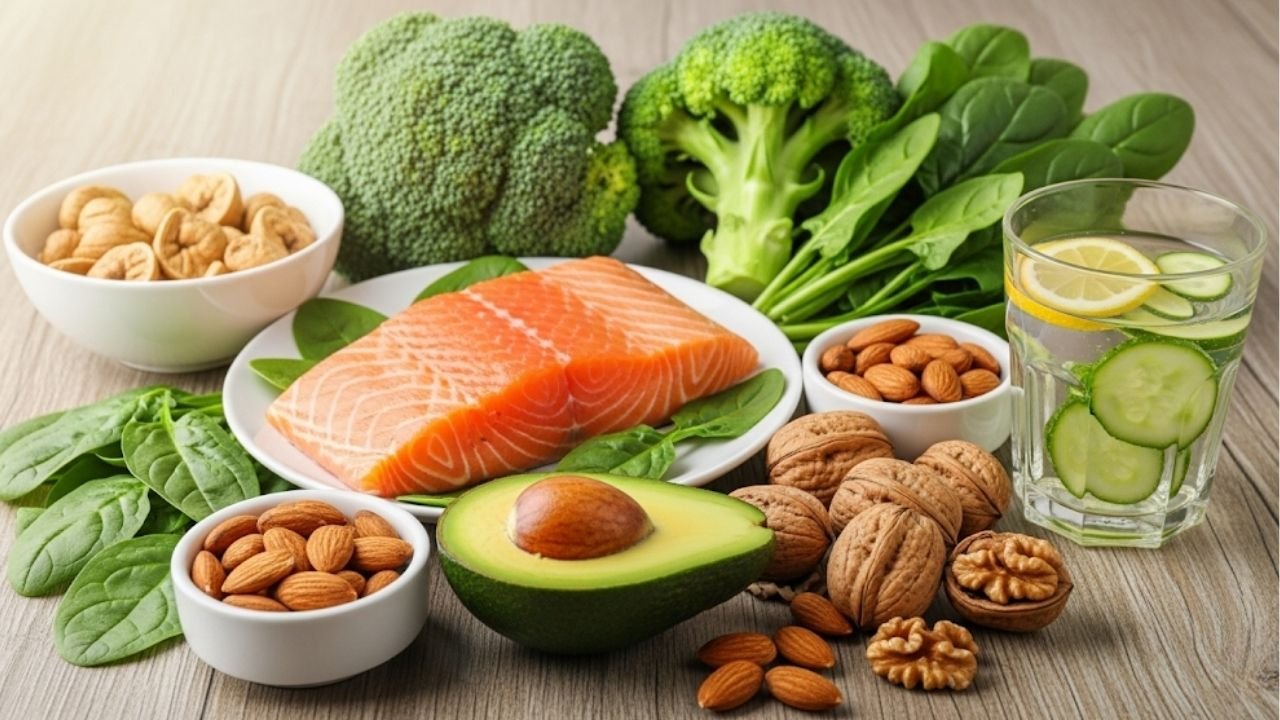8 Foods That Support Hormonal Health

Have you ever felt moody for no reason, or suddenly exhausted when the day’s just started? Maybe you’re craving sugar like it’s a life necessity, or your sleep is out of whack. More often than not, hormonal health is the invisible force behind it all. Hormones are like the silent DJs of your body—they decide the playlist of your energy, moods, appetite, skin, and more.
When hormones are in balance, we feel alive, centered, and well. But when they’re out of sync, things go downhill fast. I remember during my late 20s, stress took over, and my energy hit rock bottom. After many sleepless nights and foggy mornings, I started learning how much food influenced my hormone levels. What I found changed my life—and my kitchen.
So, let’s dive into eight powerful foods that help reset your hormones naturally. These aren’t magic pills, but they work like gentle nudges, helping your body find its rhythm again.
1. Avocados: Nature’s Creamy Hormone Hero
Avocados are one of those foods that feel like a warm hug. Rich, smooth, and satisfying—like your body saying, “thank you.” But what makes them a hormonal health superstar?
These green gems are packed with healthy fats, especially monounsaturated fats. Your body uses these fats to make hormones, particularly estrogen and progesterone. Without enough healthy fat, your hormones can’t stay balanced. Think of avocados as the foundation bricks of your hormone house.
They’re also full of fiber, which helps flush out excess estrogen. When too much estrogen builds up, you might notice heavy periods, mood swings, or bloating. Fiber helps your liver and gut gently get rid of that excess.
Quick Tip: Add half an avocado to your morning toast or toss it into your smoothie. It keeps you full and helps your hormones feel safe and steady.
Why Avocados Matter for Hormones:
-
High in monounsaturated fat
-
Supports estrogen and progesterone balance
-
Rich in fiber for detox
-
Contains potassium, which reduces stress hormones like cortisol
2. Flaxseeds: Tiny Seeds with Big Hormonal Power
Don’t let their size fool you—flaxseeds are mighty. They’re a favorite of mine because they’re so easy to add to anything. I sprinkle them on oatmeal, mix into yogurt, or even toss into banana bread.
Flaxseeds contain lignans, which help balance estrogen levels. For people with estrogen dominance (like me during stressful months), these compounds are a lifesaver. They gently nudge estrogen into balance without pushing too far.
They’re also rich in omega-3 fatty acids, which fight inflammation. And inflammation is like throwing a wrench into your hormonal system—causing cortisol spikes and blocking insulin sensitivity.
Pro Tip: Use ground flaxseed instead of whole—your body absorbs it better.
Table: Flaxseed Nutritional Breakdown
| Nutrient | Per 1 tbsp (7g) |
|---|---|
| Fiber | 1.9g |
| Omega-3 (ALA) | 1.6g |
| Lignans | 85mg |
| Protein | 1.3g |
| Calories | 37 |
Why Flaxseeds Help:
-
Support estrogen metabolism
-
Improve gut health (key to hormone detox)
-
Reduce inflammation
-
Help manage PMS symptoms
3. Wild Salmon: A Mood-Lifting Omega-3 Feast
There’s something about salmon that feels deeply nourishing. Maybe it’s the color, or the fact it’s brain food. But it’s also incredible for hormonal health.
Salmon is rich in omega-3 fatty acids, which help lower inflammation and support your brain. And guess where many of your hormones are regulated? That’s right—your brain, specifically the hypothalamus and pituitary gland.
During times of high stress, salmon can be a comforting way to help reduce cortisol, the stress hormone. Plus, omega-3s boost dopamine and serotonin, two neurotransmitters linked to happy moods and stable emotions.
Try this: Bake salmon with lemon, garlic, and olive oil for a feel-good dinner.
Why Wild Salmon Supports Hormones:
-
High in anti-inflammatory omega-3s
-
Supports brain-hormone connection
-
Balances mood-related hormones
-
Rich in protein and vitamin D
4. Leafy Greens: The Hormone Reset Button
Spinach, kale, Swiss chard, arugula—these aren’t just for smoothies and salads. Leafy greens are packed with magnesium, iron, and B vitamins, all crucial for keeping hormones humming.
Back when I dealt with monthly PMS migraines, increasing my intake of greens changed everything. Magnesium in particular helped relax my nervous system and reduce the tension.
Leafy greens also support liver detox, which is where excess estrogen gets processed. A sluggish liver can cause hormonal traffic jams, leading to acne, fatigue, or period irregularity.
Tip: Sauté spinach with garlic and olive oil. It’s fast, delicious, and hormone-friendly.
Bullet Points: Greens and Hormones
-
Rich in detox-supporting chlorophyll
-
High in magnesium for nervous system balance
-
Support estrogen clearance
-
Provide B vitamins for hormone production
5. Eggs: Nutrient-Dense Hormone Builders
Eggs are like nature’s multivitamin. The yolk—yes, please eat the yolk—is rich in choline, vitamin D, selenium, and healthy fats. All of these support your body’s hormone-making process.
During one of my most tired phases—early motherhood—eggs saved me. I had them boiled, scrambled, poached… every way possible. They kept me grounded, full, and focused.
Vitamin D helps regulate insulin and supports testosterone and estrogen. Selenium supports your thyroid, which is the engine behind metabolism and energy. Without it, you feel drained and foggy.
Note: Pasture-raised eggs have more nutrients than factory-farmed ones.
Why Eggs Matter for Hormonal Health:
-
Build estrogen and progesterone
-
Support thyroid function
-
Boost energy and mental clarity
-
Rich in essential amino acids
6. Sweet Potatoes: Comfort Food That Loves Your Hormones Back
There’s something cozy about sweet potatoes. They’re grounding, slightly sweet, and deeply satisfying—like a warm hug on a rainy day.
But they’re more than comfort food. Sweet potatoes are packed with slow-digesting carbohydrates, which help manage blood sugar. Balanced blood sugar = balanced insulin, and insulin is a key player in hormonal harmony.
They’re also rich in vitamin A (beta-carotene), which supports progesterone production—a hormone many women tend to be low in, especially during perimenopause or after chronic stress.
How to enjoy: Roast them with cinnamon or mash with coconut oil.
Sweet Potato Benefits for Hormones:
-
Help stabilize insulin
-
Boost progesterone production
-
Provide mood-supporting B6
-
High in fiber and antioxidants
7. Berries: Small, Sweet, and Packed with Antioxidants
Blueberries, raspberries, strawberries—they’re not just for desserts. Berries are antioxidant-rich, which means they fight oxidative stress. And oxidative stress messes with estrogen, progesterone, and even testosterone levels.
What’s beautiful about berries is they’re low in sugar but high in fiber. That combo helps regulate insulin while keeping inflammation low. Personally, I’ve found that swapping sweets for a berry bowl after dinner helps me sleep better and feel lighter.
They’re also a lovely source of vitamin C, which supports adrenal health. Your adrenals make cortisol, so they need love too—especially during stressful seasons.
Snack idea: Frozen berries with a spoonful of almond butter. Trust me, it’s divine.
Berries Help With:
-
Lowering oxidative stress
-
Supporting adrenal health
-
Managing insulin sensitivity
-
Improving skin clarity (hello, hormonal acne)
8. Fermented Foods: The Gut-Hormone Connection
Let’s talk about sauerkraut, kimchi, kefir, and plain yogurt. Fermented foods support gut health, which is where a big chunk of your hormone work happens.
A healthy gut helps your body detox excess estrogen and process nutrients like zinc and magnesium. I used to skip fermented foods because I thought they tasted weird. But once I started adding a spoon of kimchi to rice bowls or sipping kefir with breakfast, my digestion improved, and so did my skin.
Also, your gut microbiome influences the gut-brain axis—the two-way street between mood and hormones. A balanced gut means a more stable mood and smoother cycles.
Start slow: A tablespoon of sauerkraut a day goes a long way.
Why Fermented Foods Support Hormones:
-
Improve digestion and nutrient absorption
-
Help break down and excrete estrogen
-
Support immune function
-
Balance mood via the gut-brain connection
Final Thoughts: Food Is the First Step Toward Hormonal Harmony
Your hormones respond to how you live—and food is the loudest signal you can send. These eight foods aren’t just nutrients; they’re messages. They say to your body, “You’re safe. You can rest. You can thrive.”
It’s easy to think we need to overhaul everything at once. But real healing comes from small, consistent choices. Start with one food. Maybe it’s adding flaxseeds to your smoothie, or eating a few more eggs each week. Bit by bit, your body will start to feel the shift.
Hormonal health isn’t just about periods, fertility, or menopause. It’s about feeling good in your skin, having steady energy, and showing up fully in your life. And food is your most loving ally on that path.
So, here’s to hormone-happy meals, peaceful mornings, and a body that feels like home again.
